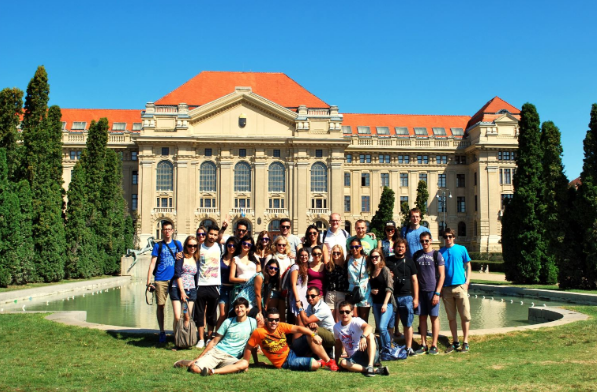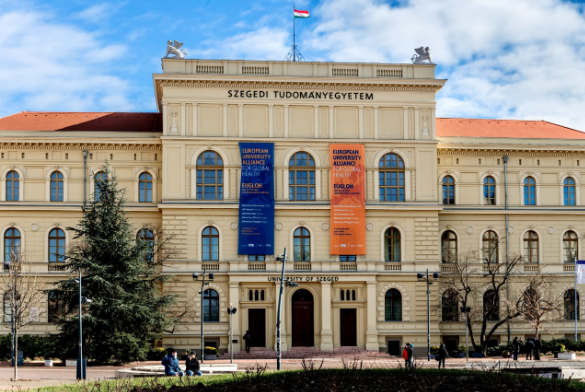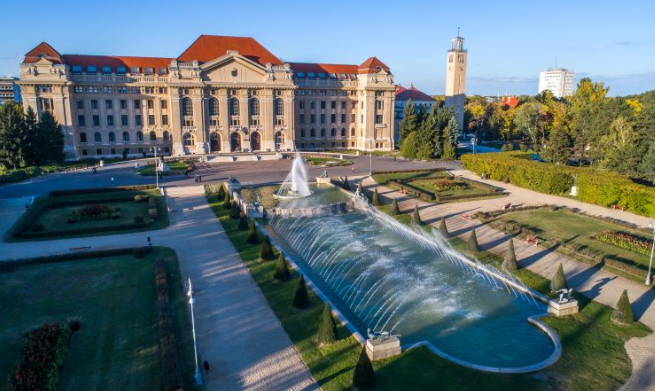Studying on Scholarship in Hungary

Hungary has become an increasingly popular destination for international students seeking high-quality education at affordable costs. Its rich cultural heritage, globally recognized universities, and numerous scholarship opportunities make it a top choice for students aspiring to study abroad. Whether you’re pursuing a Bachelor’s, Master’s, MPhil, or PhD, Hungary offers an academic pathway tailored to your needs, with financial support to help make your dreams a reality.
Why Choose Hungary for Education?
Affordable education: Tuition fees in Hungary are among the lowest in Europe, and scholarships can cover a significant portion of costs.
World-class institutions: Hungarian universities are known for their excellence in medicine, engineering, arts, and humanities.
Cultural diversity: Studying in Hungary provides exposure to a multicultural environment and vibrant student life.
Scholarship opportunities: Programs like the Stipendium Hungaricum Scholarship and Erasmus+ provide full or partial financial aid to international students.
This guide will walk you through the complete process of studying on scholarship in Hungary, covering every essential step from pre-application requirements to post-graduation career opportunities.
Why Study on Scholarship in Hungary?
Here are some compelling reasons why international students choose Hungary for higher education on a scholarship.
- Affordable Education with Scholarships
Scholarships like the Stipendium Hungaricum, provided by the Hungarian government, can cover tuition fees, accommodation, and even provide a monthly stipend for living expenses. - Globally Recognized Universities
Hungarian universities, such as Semmelweis University, Ethos Loran University, and University of Szeged, are internationally recognized for their academic excellence, particularly in medicine, engineering, and natural sciences. Degrees from these institutions are widely accepted across the globe. - Diverse Scholarship Programs
International students can benefit from a range of scholarships tailored to various levels of study, including:
Stipendium Hungaricum Scholarship: Covers tuition fees, accommodation, health insurance, and a monthly stipend.
Erasmus+ Programs: Focused on exchange opportunities and funding for EU and non-EU students.
CEEPUS Program: Targeting Central European students with regional mobility.
- Cultural and Linguistic Advantages
Studying in Hungary gives you the chance to learn Hungarian while also improving your English, as many courses are offered in English. Additionally, Hungary’s central location in Europe makes it a gateway to exploring other European countries. - Strong Practical Training Focus
Hungary’s education system emphasizes practical training, internships, and research opportunities. Fields like medicine and engineering include hands-on rotations, ensuring students graduate with real-world experience. - Post-Graduation Opportunities
Hungary’s growing economy and strategic location in Europe provide numerous career and further education opportunities for graduates. Work permits are available for international students post-graduation, enabling them to build careers within the country.

Overview of the Education System in Hungary
Hungary’s education system is structured to meet international standards while providing students with ample opportunities for practical learning and research. Whether you aim to pursue a Bachelor’s, Master’s, MPhil, or PhD, Hungary’s universities offer a wide range of programs tailored to diverse academic and professional goals.
- Levels of Education
Hungarian higher education is divided into three main cycles:
Bachelor’s Degree (BA/BSc): Typically 3-4 years, focusing on foundational knowledge and skills.
Master’s Degree (MA/MSc): Lasts 1-2 years, offering advanced education in a specialized field.
Doctoral Degree (PhD/DLA): A 3-4 year program emphasizing original research and academic contribution.
Some fields, like medicine, dentistry, and veterinary studies, offer single-tier programs, which combine undergraduate and postgraduate studies into a continuous 5-6 year program.
- Credit System
Hungarian universities follow the European Credit Transfer System (ECTS), making it easier to transfer credits or pursue further education across Hungary. - Language of Instruction
Proficiency in the medium of instruction is usually required for admission, demonstrated through tests like TOEFL, IELTS, or equivalent. - Academic Calendar
The academic year in Hungary is divided into:
Fall Semester: September to January
Spring Semester: February to June
Each semester includes a lecture period and an exam period.
- Focus on Practical Training
Hungarian universities are renowned for their emphasis on internships, rotations, and research. Programs in fields like medicine, engineering, and business integrate real-world applications to prepare students for global careers. - International Collaboration
Hungary participates in several international educational initiatives, including Erasmus+ and CEEPUS, enabling student exchanges and collaborations across Europe and beyond.
Step 1:
Pre-Application Requirements
Before applying to a Hungarian university or scholarship program, international students must meet specific academic, language, and administrative prerequisites. Ensuring that you fulfill these requirements is crucial to a smooth application process.
- Educational Prerequisites
Bachelor’s Programs: A high school diploma or equivalent is mandatory. Some programs may require specific subject prerequisites, such as biology and chemistry for medical studies.
Master’s Programs: A recognized undergraduate degree in a related field is essential.
PhD Programs: A relevant Master’s degree with strong academic performance and research experience. - Recommended High School Subjects
For students aiming to pursue specific fields, the following high school subjects are recommended:
Medicine and Health Sciences: Biology, Chemistry, Physics.
Engineering and Technology: Mathematics, Physics, Computer Science.
Social Sciences and Humanities: History, Literature, Economics.
- Language Proficiency Requirements
Since many programs are offered in English, international students must demonstrate proficiency in the language of instruction:
English Programs: TOEFL (minimum 72), IELTS (minimum 5.5), or equivalent test scores.
Hungarian Programs: A basic understanding of Hungarian may be required, often supplemented with language preparation courses.
- Entrance Exams Required
Some programs, particularly in competitive fields like medicine, require entrance exams or interviews to assess the applicant’s knowledge and skills:
Medical Entrance Exam: Tests knowledge in biology, chemistry, and English.
Engineering Aptitude Tests: Focus on mathematics and physics.
Portfolio Reviews: For arts and design programs, portfolios showcasing prior work may be required.
- Research Scholarship Eligibility Criteria
Different scholarship programs have varying criteria:
Stipendium Hungaricum: Requires nomination by the student’s home country and proof of meeting academic requirements.
Erasmus+: Eligibility depends on the partnership agreements between institutions.
Step 2:
Applying to Schools, Colleges, and Universities in Hungary
The application process for studying on scholarship in Hungary involves careful planning and attention to deadlines. Below is a step-by-step guide to help you successfully navigate this stage.
- Application Process for International Students
The general application process includes the following steps:
Look for programs offering scholarships, such as the Stipendium Hungaricum.
Register Online: Most universities in Hungary have an online application system. Create an account and complete your profile on the respective university portal or the official Stipendium Hungaricum platform.
Submit Application Form: Fill out the application form, including personal details, academic history, and the program you’re applying for. - Key Deadlines and Timelines
Timing is critical when applying to Hungarian universities:
Application Period: Typically starts in November and ends in January or February for programs beginning in the fall semester.
Notification Period: Applicants usually receive admission results between April and June.
Scholarship Applications: Deadlines for scholarships like Stipendium Hungaricum often coincide with university application deadlines.
- Documents Required for Admission
Ensure all documents are properly prepared and translated into English or Hungarian if required:
Educational Certificates: High school diploma, Bachelor’s or Master’s degree transcripts, depending on the program.
Language Proficiency Proof: TOEFL, IELTS, or Hungarian language test scores.
Portfolio (if applicable): Required for arts and design programs.
- Application Fee
Some universities charge a non-refundable application fee, typically between 50-150 EUR, depending on the institution. - Scholarship-Specific Applications
For scholarships like Stipendium Hungaricum, you may need additional documents, such as a nomination form from your country’s ministry of education.
Once you’ve submitted your application, universities will evaluate your profile. Shortlisted candidates may be invited for interviews or entrance exams.

Step 3:
Education Requirement Structure in Hungary
Hungary’s education system is designed to offer a robust academic foundation, coupled with practical training and research opportunities. Understanding the structure of education, including part-time job options, rotations, and cost management, is crucial for international students aiming to study on scholarships.
- Overview of the Curriculum
Hungarian universities emphasize a balance between theoretical and practical knowledge. Here’s what you can expect:
Bachelor’s Programs (3-4 years): Core courses in the chosen discipline, supplemented by general education subjects and elective courses.
Master’s Programs (1-2 years): Advanced coursework focusing on specialization and research.
PhD Programs (3-4 years): Research-intensive, requiring the submission and defense of a dissertation.
Integrated Programs (5-6 years): Single-cycle degrees in fields like medicine and law.
- Part-Time Jobs and Internships
International students are allowed to work part-time during their studies.
Work Hours: Up to 20 hours per week during semesters and full-time during holidays.
Internship Opportunities: Many programs, particularly in engineering and business, include internships as part of the curriculum. Scholarships like the Stipendium Hungaricum may also facilitate internships.
- Rotations and Practical Training
In fields like medicine and engineering, practical training is a core component:
Clinical Rotations: For medical students, clinical rotations begin in the later years, offering hands-on patient care experience.
Engineering Labs and Projects: Opportunities to work on real-world problems in collaboration with industry partners.
Research Opportunities: Access to cutting-edge research labs, often funded through scholarships.
- Duration and Cost of Education
The duration and costs vary depending on the program and scholarship coverage:
Tuition Fees:
Bachelor’s: €2,000–€4,000 per year.
Master’s: €3,000–€5,000 per year.
Medicine: €12,000–€16,000 per year.
Scholarship Coverage: The Stipendium Hungaricum and similar programs often cover full tuition, accommodation, and provide monthly stipends.
Living Expenses: €600–€800 per month for housing, food, and other costs. Scholarships help significantly reduce this financial burden.
By understanding the structure and opportunities available, you’ll be better prepared for your academic journey in Hungary.
Step 4:
Exams, Licensing, and Certifications Required
For international students studying in Hungary, certain exams, certifications, and licensing requirements must be met, particularly for regulated professions such as medicine, engineering, and teaching. These requirements ensure that graduates are equipped with the necessary skills and qualifications to enter their respective fields.
- Licensing Exams in Hungary
Depending on your chosen field, you may need to pass licensing exams to practice or work professionally:
Medical Licensing Exam:
Required for graduates of medical programs to obtain the right to practice as a doctor.
Administered by the Hungarian Health Licensing Office (ÁEEK).
Engineering Licenses:
Graduates in fields like civil or mechanical engineering may need certifications issued by professional bodies.
Teaching Licensure:
Teaching programs may require completion of a national teaching exam to work in Hungarian schools.
- Certification Bodies and Exams
Several certification bodies oversee professional licensing:
National Healthcare Service Center (ÁEEK): Handles certification and licensing for medical and healthcare graduates.
Hungarian Chamber of Engineers: Offers certification for engineering graduates.
Hungarian Accreditation Committee: Oversees general academic program validation and professional standards.
- Language Proficiency Exams (if applicable)
Graduates may be required to pass a Hungarian language proficiency test for roles that involve direct communication with local populations, such as in healthcare or teaching.
For non-Hungarian speakers, programs offered in English may require no additional language tests unless mandated by the employer or regulatory body. - Exams After Graduation
If pursuing further studies or specialization, you may encounter additional examinations:
PhD Candidacy Exams: For students continuing their education in research-intensive fields.
Specialization Exams: Particularly in medicine and engineering, specialization pathways often involve rigorous exams to demonstrate expertise.
- Scholarship-Specific Obligations
Students on scholarships like the Stipendium Hungaricum may need to fulfill certain requirements, such as maintaining good academic standing and reporting progress to the scholarship provider.
Successfully completing the necessary exams and certifications is essential for accessing advanced academic opportunities or entering the Hungarian workforce.
Step 5:
Post-Graduation Pathways with Scholarship
After completing your studies in Hungary, there are numerous opportunities for international students to advance their careers or pursue further education. From internships and residency programs to full-time employment, Hungary’s growing economy and supportive visa policies make it an attractive destination for graduates.
- Internship and Residency Programs in Hungary
Many programs integrate internships or residencies to provide practical experience:
Medical Graduates:
Mandatory residency programs in hospitals or clinics for specialization.
Opportunities to work under the supervision of certified professionals, often funded or supported by scholarships.
Engineering and Business Graduates:
Internships with multinational corporations or Hungarian firms are common during or immediately after studies.
Scholarships like the Stipendium Hungaricum may offer networking opportunities to secure internships.
- Steps to Achieve Full Job Licensure
Graduates in fields like medicine or law need to follow these steps:
Pass required licensing exams (e.g., Hungarian medical licensing exam).
Complete necessary supervised work (e.g., clinical rotations or residency).
Register with the relevant professional body, such as the Hungarian Health Licensing Office or the Hungarian Chamber of Engineers.
- Specialization and Further Training Options
Hungary offers advanced training programs and specialization opportunities:
Medical Specializations: Programs in surgery, pediatrics, and internal medicine are widely available.
Research and PhD Opportunities: Hungary’s universities provide strong support for doctoral research in fields like biotechnology, engineering, and humanities.
- Employment Opportunities After Graduation
Hungary has a thriving job market for skilled graduates:
Work Permit: International students can apply for a work permit after completing their studies, often as part of the post-study work visa process.
In-Demand Sectors: Medicine, engineering, IT, and teaching are among the most sought-after fields.
Expected Salaries:
Medicine: €35,000–€50,000 annually.
Engineering: €25,000–€40,000 annually.
Teaching: €15,000–€25,000 annually.
- Scholarship Support for Post-Graduation Plans
Many scholarships, including Stipendium Hungaricum, provide alumni networking platforms to help graduates secure internships or jobs.
Some programs may offer post-graduation grants for research or further training.
Understanding these pathways ensures you’re well-prepared to transition from academic life to a successful career in Hungary or beyond.
Cost of Studying in Hungary: How Scholarships Help
Studying in Hungary is an affordable option compared to other European countries, especially when supported by scholarships. This section covers the costs involved and how scholarships significantly ease financial burdens for international students.
- Tuition Fees in Hungary
Tuition fees vary depending on the program and university:
Bachelor’s Programs: €2,000–€4,000 per year.
Master’s Programs: €3,000–€5,000 per year.
PhD Programs: Free in most cases, especially under government-funded scholarships.
Medical Programs: €12,000–€16,000 per year due to the specialized nature of the training.
- Living Expenses
Accommodation: €200–€400/month, depending on location and type (dormitory or private housing).
Food: €150–€200/month.
Transportation: €10–€20/month (discounted student passes).
Miscellaneous Costs: €50–€100/month for leisure, books, and personal expenses. - Scholarship Coverage
Scholarships like the Stipendium Hungaricum cover a significant portion of the costs:
Tuition Fee: Fully waived for most programs.
Monthly Stipend: €120–€150 for Bachelor’s and Master’s students, and €400 for PhD students.
Accommodation Allowance: Dormitory costs are covered, or students receive a housing contribution.
Health Insurance: Basic medical insurance is included.
- Additional Financial Aid Options
Students not covered by scholarships can explore alternative funding sources:
Erasmus+ Program: Offers financial support for exchange studies and internships within Europe.
Institutional Scholarships: Many Hungarian universities offer merit-based or need-based scholarships.
Part-Time Jobs: International students can work up to 20 hours per week, earning around €5–€8 per hour.
- Cost-Benefit Analysis of Scholarships
By utilizing scholarships, international students can.
Reduce financial stress and focus on their studies.
Minimize or eliminate reliance on loans or external funding.
Scholarships in Hungary provide not just financial support but also a pathway to affordable, high-quality education.
Visa Requirements for International Students
As an international student planning to study in Hungary on scholarship, obtaining the right visa is a crucial step. Hungary, as a Schengen Area country, offers specific visa categories for non-EU students. Below is a detailed guide on the visa requirements, processes, and the opportunities available for international students.
- Student Visa for Hungary (Type D Visa)
International students from outside the EU/EEA need a Student Visa (Type D) to study in Hungary.
Visa Eligibility Criteria:
Admission to a Hungarian University: You must have an official admission letter from a recognized Hungarian institution.
Proof of Financial Support: Proof that you can cover your tuition fees, living expenses, and return costs. Scholarships like Stipendium Hungaricum typically provide this proof.
Valid Passport: Your passport must be valid for at least six months after the intended start of your studies.
Health Insurance: International students are required to have health insurance that covers them during their stay in Hungary. This can often be arranged through the university or scholarship program.
- Application Process for Student Visa
Submit Documents: Prepare documents like your admission letter, proof of scholarship (if applicable), financial support, and valid passport.
Visa Application Form: Complete the Hungarian student visa application form available at the Hungarian embassy or consulate in your home country.
Interview: Some embassies may request an interview to confirm your intent to study and return after completion.
Visa Fees: The application fee for a student visa typically ranges between €60–€100, depending on the embassy. - Visa Processing Time
Visa processing typically takes 2-4 weeks, but it’s recommended to apply at least 3 months before your intended travel date to avoid delays. - Residence Permit for Students
The residence permit is required for stays longer than 90 days and is typically valid for one year, with the option to renew it annually as long as you continue studying. - Work Permits and Post-Graduation Work Opportunities
Work during Studies: International students can work up to 20 hours per week during the academic year and full-time during holidays.
Post-Graduation Work Permit: Upon completion of your studies, you can apply for a post-graduation work permit if you intend to stay in Hungary for employment.
Job Search Visa: Hungary offers a job search visa for up to 9 months after graduation, allowing graduates to find a job in their field of study. - Visa Renewal and Extension
Renewing Your Student Visa: You can extend your student visa and residence permit annually, provided you remain enrolled in your program.
Work Permit Extension: Once you secure a job in Hungary, you can switch from a student residence permit to a work permit, facilitating long-term employment opportunities.
The student visa process is relatively straightforward but requires careful preparation of documents and timely submission. With the support of scholarships, students can significantly ease their financial and bureaucratic burdens during this process.

Career Prospects for International Students in Hungary
Graduating from a Hungarian university opens up numerous career opportunities, both within Hungary and globally. With a growing economy and a focus on innovation, Hungary is becoming an increasingly attractive destination for international graduates. In this section, we’ll explore the job market for graduates, expected salaries, and how scholarships contribute to long-term career success.
- Job Market for Graduates in Hungary
Hungary’s job market is dynamic, with strong demand for skilled professionals in several key sectors:
Healthcare: Graduates of medical and health-related programs, especially those trained in Hungary, are in high demand in both local hospitals and private clinics.
Engineering and IT: Hungary is home to many international companies in automotive, electronics, and IT, offering plenty of job opportunities for graduates in engineering, computer science, and technology.
Business and Finance: With Budapest as a growing business hub, there are increasing opportunities for graduates in finance, marketing, and management.
Education and Research: There is a consistent demand for qualified teachers and researchers, particularly for those who can work in both Hungarian and English.
Hungarian universities provide strong ties to local and international industries, which helps graduates transition from academic life to professional careers.
- Expected Salaries and Employment Opportunities
Salaries for graduates in Hungary can vary depending on the field, location, and experience
Medicine:
General practitioners can earn between €25,000–€40,000 annually, while specialists can make between €45,000–€65,000.
Engineering:
Graduates in engineering fields typically earn between €20,000–€35,000 per year, with higher salaries for specialized fields.
IT and Software Development:
Software engineers and IT professionals can expect to earn between €30,000–€50,000 annually.
Business and Finance:
Entry-level salaries in business roles start at around €18,000–€30,000, with opportunities for growth in multinational companies.
Teaching:
Teachers typically earn between €15,000–€25,000 annually, though this can vary depending on the level of education and location. - Job Search and Networking Opportunities
Hungary offers various platforms for graduates to connect with potential employers:
Job Fairs and Expos: Hungary regularly hosts job fairs where international students can meet potential employers from various sectors.
Alumni Networks: Scholarship programs like Stipendium Hungaricum often maintain strong alumni networks that help graduates find job opportunities in Hungary and abroad.
- Entrepreneurship and Startups
For those interested in starting their own business, Hungary offers a relatively low cost of living and a supportive startup environment, particularly in Budapest. There are government incentives for entrepreneurs, and Hungary is home to a growing number of tech startups, providing opportunities for graduates with entrepreneurial aspirations. - Post-Graduation Work and Residency
Graduates from Hungarian universities on scholarships like Stipendium Hungaricum have the advantage of staying in Hungary after their studies to pursue work opportunities. The Hungarian government has made it easier for graduates to remain in the country by offering post-study work permits and residence options, which help bridge the gap between graduation and employment. - Scholarships and Career Development
Scholarships like Stipendium Hungaricum are not just financial support—they also open doors to numerous career development opportunities:
Networking with Professionals: As a scholarship recipient, you gain access to a network of professionals, companies, and alumni that can help you secure a job after graduation.
Internships and Work Experience: Many scholarship programs have partnerships with companies and institutions, offering internships that can lead to full-time employment.
Further Funding for Research: For those pursuing research or PhD programs, scholarships can provide funding for post-graduate research opportunities, contributing to long-term career advancement.
By understanding the job market and making use of scholarships and networking opportunities, international graduates can achieve successful career outcomes in Hungary.

Conclusion:
Key Takeaways for Aspiring Students
Studying in Hungary on a scholarship offers incredible opportunities for international students to gain a world-class education while enjoying affordable living costs. The country provides a supportive environment for both academic growth and career development. Here’s a recap of the key points:
- Why Study in Hungary on Scholarship?
Hungary offers a high-quality education at an affordable price, with numerous scholarships like the Stipendium Hungaricum covering tuition fees, accommodation, and living expenses.
The country’s education system is internationally recognized, particularly in fields like medicine, engineering, and business, making it an attractive option for students. - Scholarship Requirements and Application Process
To study in Hungary on a scholarship, you must meet specific eligibility requirements, including academic qualifications and proof of financial support.
The application process is straightforward, but careful attention to deadlines and document preparation is essential for success. - Educational Pathways and Career Opportunities
Hungary’s universities provide strong academic programs and practical training, often through internships or residencies, that prepare students for the job market.
Graduates can expect competitive salaries in fields like healthcare, IT, and engineering, with opportunities to secure post-graduation work permits and long-term residency. - Visa and Residency Considerations
International students must apply for a student visa before traveling to Hungary and a residence permit after arrival. The process is manageable but requires careful preparation.
Post-graduation, students can apply for work permits or job search visas to stay and work in Hungary, with a strong job market for skilled professionals. - Financial Support Through Scholarships
Scholarships significantly reduce the financial burden of studying abroad, covering not just tuition fees but also living expenses and health insurance.
Additional financial aid, part-time job opportunities, and student discounts help make life in Hungary even more affordable. - Long-Term Career Prospects
With a growing economy, Hungary offers numerous job opportunities for graduates, particularly in high-demand sectors such as healthcare, engineering, and IT.
Graduates benefit from networking opportunities through scholarships and university career services, making it easier to transition into full-time employment.
Studying in Hungary on a scholarship is not only an opportunity to earn a degree but also a pathway to a successful career in a thriving European economy. Whether you’re pursuing a Bachelor’s, Master’s, or PhD, Hungary offers a conducive environment for both academic and professional growth.
Resources for More Information
Hungarian Scholarship Programs: Stipendium Hungaricum
Visa and Immigration Information: Hungarian Ministry of Foreign Affairs
Career Opportunities in Hungary: Hungarian Chamber of Commerce and Industry
By following these steps and leveraging available scholarships, you can make your dream of studying in Hungary a reality.
For example, regional scholarship Adisurc covers for “University of Campania Luigi Vanvitelli” and “University of Naples Federico II“. Keep in mind, for these scholarships you have to apply separately from university of Hungary and their dates may be different from those of IMAT and pre-enrollment.
